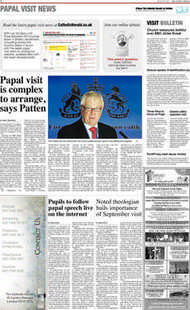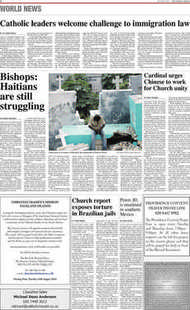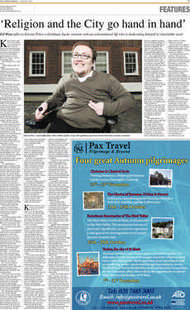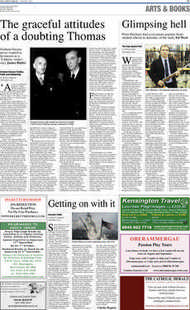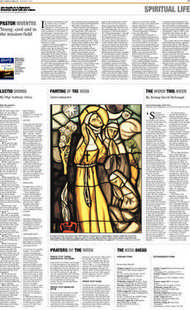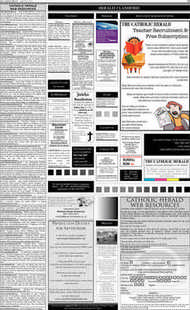Page 15, 6th August 2010
Page 15

Report an error
Noticed an error on this page?If you've noticed an error in this article please click here to report it.
Tags
Share
Related articles
‘it’s Bolshevism For The Home Counties’
Brothers At War: Hitchens Takes On Hitchens In Bitter...
How Tony Blair Might Have Defeated Christopher Hitchens...
Strangers In Our Own Land
Filling The God-shaped Hole With Psychobabble And Angry...
Churches: Lobby For Government?
Glimpsing hell
Peter Hitchens had a circuitous journey from strident atheist to defender of the faith, Ed West
The Rage Against God
BY PETER HITCHENS CONTINUUM, £16.99
We do not know whether Peter Hitchens was aware of his brother Christopher’s illness when he wrote this memoir, but the revelation that the great atheist commentator is suffering from throat cancer adds poignancy to Peter’s latest book.
Peter Hitchens, the younger by two years, is a committed Anglican and defender of conservative (but not Conservative) England. Like his brother, and many of the babyboomer generation, he rebelled against the world they grew up in, a gloomy and melancholy but safe post-War Britain, one of minor public schools steeped in the naval tradition where children were raised to be English gentlemen.
It is a world long passed, and it was Hitchens’s generation who destroyed it, determined to overthrow Christian civilisation because, as he recalls: “We were sure that we, and our civilisation, had grown out of the nursery myths of God, angels and heaven.” At the age of 15 he set fire to the family Bible, but “it would be many years before I would feel a slight shiver of unease about my act of desecration”.
A far-Left cultural revolutionary in the 1970s, Hitchens was in his early 30s, and had experienced life behind the Iron Curtain covering the Polish shipyard strikes when he began to feel strong unease. “I no longer avoided churches,” he writes. “I recognised in the great English cathedrals, and in many small parish churches, the old unsettling messages. One was the inevitability of my own death, the other the undoubted fact that my despised forebears were neither crude nor ignorant, but men and women of great skill and engineering genius, a genius not contradicted or blocked by faith, but enhanced by it.” On a cycling trip to Burgundy he saw Rogier van der Weyden’s 15thcentury Last Judgment, and this made a lasting impression. “I had scoffed at its mention in the guidebook, but now I gaped, my mouth actually hanging open, at the naked figures fleeing towards the pit of hell. I had a sudden strong sense of religion being a thing of the present day, not imprisoned under thick layers of time. My large catalogue of misdeeds replayed themselves rapidly in my head. I had absolutely no doubt that I was among the damned, if there were any damned. Van der Weyden was still earning his fee, nearly 500 years after his death.” Fear, indeed, plays a central role in Hitchens’s Christian conservative philosophy, specifically the belief that without fear man is capable of appalling inhumanity. Christianity, on the other hand, requires men to do things which are “unnatural” to them as mammals: marry and stay faithful to the mother of their offspring, build for the future, defer gratification and even lay down their lives for others. Without such restraint the democracy and freedom that we take for granted would crumble to dust.
All of this is, of course, totally anathema to the utopian Left of his generation, who maintain the ideology that man is born free and good. This tradition found its most brutal conclusion in Bolshevik Russia, which Hitchens, who was stationed in Moscow for several years, describes with laconic grimness, a place where men would drink themselves into a stupor in grim dives and where almost half of pregnancies ended in abortion.
Two decades after the collapse of Communism Russian society has not recovered from the trauma, as its demographic death spiral testifies. But, as Hitchens points out, we are going down the same route. Marxism failed economically, but in the West it succeeded culturally once Christianity faded.
The New Atheist movement, of which his brother is joint pharaoh (with Richard Dawkins), is its latest mutation, a “Bolshevism for the Home Counties”.
It was Dawkins who called the teaching of religion “child abuse”, just as the Soviets did, and his confederate, the psychologist Nicholas Humphrey, who said that “parents... have no God-given licence to enculturate their children in whatever ways they personally choose.” This book came about as a result of a public debate in Michigan between the brothers, one that ended a long-running and bitter feud. Despite their differences it is clear that Peter loves his brother deeply, and whatever Christopher’s future health may be, we can be thankful that they were reconciled when they were.
blog comments powered by Disqus



